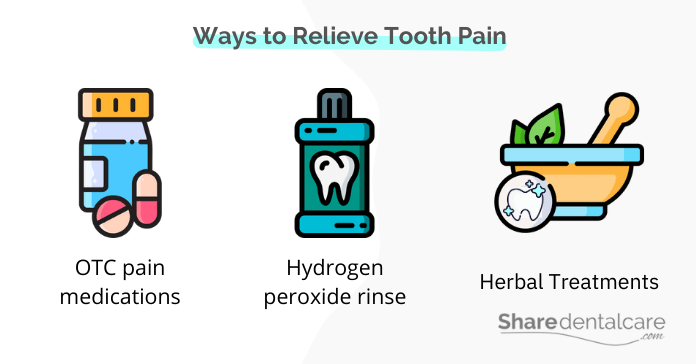Most people would agree that tooth pain is one of the worst experiences imaginable. It can make it difficult to eat, speak, and even sleep. But what many people don’t realize is that tooth pain can also have a significant impact on your life in other ways. It can affect everything from job performance to your relationships with friends and family. Do you have a toothache? Are you looking for ways to relieve tooth pain? In this blog post, we’ll discuss the different ways to relieve tooth pain quickly and effectively.
What’re the Possible Causes of Tooth Pain?
Before we discuss ways to relieve tooth pain, let’s review the possible causes of it. Tooth pain, also known as toothache, may be caused by a variety of factors, including:
- Tooth decay
- Gum disease and infection
- A cracked or broken tooth
- An exposed root due to receding gums
- Dental abscess
- Broken tooth filling
- Teeth grinding or clenching
- Partially erupted or impacted teeth
- Jaw joint disorder (TMJ)
Types of Toothache & Their Possible Causes
It’s important to understand the symptoms associated with tooth pain, as this will help you determine what type of problem may be causing it, including:
- Transient sensitivity to hot or cold may be a sign of early decay, receding gums, or broken filling.
- Constant toothache with no relief may indicate an inflammation of the tooth nerve or root canal infection.
- Sharp and/or sudden pain can be caused by an exposed nerve due to decay, a crack in the tooth, or a loose filling.
- Dull, aching pain may be a sign of teeth grinding, periodontal (gum) disease, or TMJ disorder.
- Throbbing pain can be caused by a dental abscess or infection.
- Pain radiating to the ear may indicate a jaw joint problem or an impacted wisdom tooth.
Ways to Relieve Tooth Pain at Home
If you’re experiencing tooth pain, there are several ways to temporarily relieve it at home. These include:
- OTC pain medications: Taking an over-the-counter pain reliever such as ibuprofen or acetaminophen can help to reduce inflammation and relieve the pain. Be sure to read the instructions and follow the dosage guidelines on the package.
- Try cold compress: Applying a cold compress to the area can help reduce swelling and numb the pain. Wrap some ice in a clean cloth or use a cold pack, and hold it against the affected area for 10-15 minutes.
- Salt water rinse: Mixing a teaspoon of salt in a cup of warm water and swishing it around your mouth can help reduce inflammation and pain. Spit out the solution after swishing, but be sure not to swallow it.
- Hydrogen peroxide Rinse: Mixing equal parts of hydrogen peroxide and water, then swishing it around your mouth (for one minute), can help reduce pain. Do not swallow the solution, and rinse your mouth out with water afterward.
These are just some of the ways that you can temporarily relieve tooth pain at home, however, you should see a dentist as soon as possible for a proper diagnosis and treatment.
Natural Ways to Relieve Tooth Pain
- Clove oil: Applying clove oil to the affected area can help reduce pain and inflammation. Simply soak a cotton ball in the oil and hold it against the sore tooth for 5-10 minutes.
- Garlic: Garlic has natural antimicrobial properties, which can help reduce inflammation and pain. Simply mash up a clove of garlic and apply it directly to the affected area.
- Peppermint tea: Peppermint can help to numb the pain and reduce inflammation. Soak a tea bag in hot water, squeeze out the excess water, and press it gently against the affected area.

Why Should You See a Dentist?
Although the home remedies mentioned above can help temporarily relieve tooth pain, it is important to see a dentist for a proper diagnosis and treatment. Only a qualified dental professional can accurately diagnose the cause of your tooth pain and recommend an appropriate course of treatment. Without proper treatment, the underlying cause of your tooth pain may worsen and lead to more serious dental problems in the future.
Professional Ways to Relieve Tooth Pain
Your dentist will examine the affected area and recommend suitable ways to relieve the pain and treat the underlying problem. The treatment depends on the underlying cause of the pain and may include:
- Filling and crowns: If the pain is caused by tooth decay, your dentist may recommend a filling or crown to repair it.
- Root canal treatment: If the nerve of the tooth is infected, your dentist may recommend a root canal to remove the infection and preserve the natural tooth structure.
- Professional teeth cleaning: If your tooth pain is caused by gum disease, your dentist may recommend professional teeth cleaning to remove the plaque and tartar buildup.
- Extraction: If the tooth is severely damaged or impacted, an extraction may be necessary.
- Nightguard: If the pain is caused by teeth grinding (bruxism), your dentist may recommend a nightguard to protect your teeth.
Ways to Relieve Tooth Pain – Conclusion
Tooth pain can be very unbearable, but there are some ways to temporarily relieve it at home, including taking OTC pain medications, salt water rinse, and herbal treatments. However, these home remedies don’t treat the underlying cause, so it’s important to see a dentist for proper diagnosis and treatment. The treatment depends on the underlying cause and may include fillings, root canals, professional teeth cleaning, or extraction.
Prevention is always better than cure, so maintain a good oral hygiene routine to prevent tooth pain and other dental problems. Brush your teeth twice a day, floss regularly, and visit the dentist for regular cleanings to keep your teeth and gums healthy.